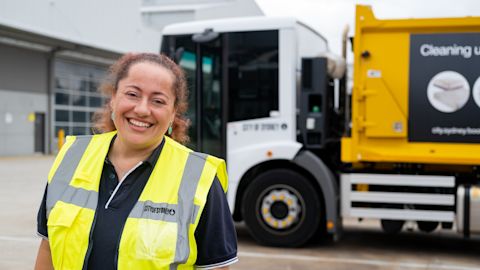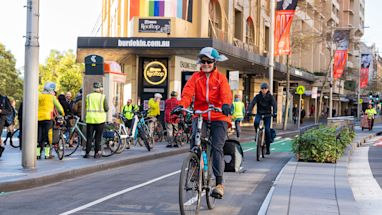Officially recognised by the United Nations in 1977, International Women's Day celebrates their achievements, raises awareness about discrimination and is a call to action for gender parity.
We’re addressing gender balance in the workplace. At the City of Sydney, women make up 43% of our workforce and 51% of our leadership roles are held by women.
We spoke to female leaders in our organisation about their careers and what they would share with young women starting their own working lives.
Have you faced barriers in your career because of your gender? How did you overcome those?
Louisa Teixeira, team leader, cleansing and waste: I think it’s well-known that gender-based discrimination and biases can exist in any profession. I think it's important to advocate for yourself, back yourself, and don’t be afraid to ask for support if you need it.
Bree Calderwood, operations coordinator, King George V Recreation Centre: I was in a female scholarship coach position at a sports organisation, but it was during a period where there was an internal restructure.
Most of the male coaches retained their positions or new ones were created for them. I was probably more qualified at the time and had higher professional playing experience, but I was left without a role and felt a lack of support because of my gender. It was a setback, but I’m a big believer that when one door closes, another one opens. I threw myself back into more study and undertook a master's in education instead.
Alison Delaney, centre manager, Juanita Nielsen Community Centre: I’ve encountered challenges related to gender inequality. When I first began working here, my superiors, including the CEO, were all male. At that time, without the presence of women in leadership positions and the necessary awareness surrounding gender bias, there were limited avenues available to address inequalities.
You could either file a formal complaint with HR (all male) and face concerns about future working relationships with the individual in question, or simply get on with the work. In my case, I chose to persevere despite these obstacles.
Catherine Flanagan, area team leader, libraries and learning: I’ve been lucky – we were paid the same as our male-identifying colleagues at the ABC where I started out, because even in the 1980s it was an equal opportunity employer.
What progress have you seen on gender equality in your time? Any specific examples?
Louisa: I think organisations are becoming more aware of gender biases and discrimination in their hiring practices. They realise that creating a diverse and inclusive workplace can help to break down barriers and create better outcomes for the business.
Bree: I took an opportunity to work at Womensport NSW as a sports administrator and events officer. It gave me valuable experience working closely with a board and directly play a role towards improved gender equity in sport for women and girls. This became my passion – we took our Girls Get Active event all over NSW inspiring girls to take up or continue sport.
We also advocated for greater exposure of women’s sport and increased pay for women in sport – we did it through social media, events and engaging strategically with councils. We ended up getting funding and the organisation was able to drive improvements across NSW.
For example, councils were encouraged to make changes to their community strategic plans to allow for greater equity in use of sporting fields for women and girls teams. They adopted plans to make changerooms for women safer and include mirrors, improved lighting and female referee changerooms and bathrooms at sporting grounds.
Alison: It’s been inspiring to witness the progress made in Australia and within our own organisation in addressing gender inequality. There’s been significant strides made in closing the gender pay gap, increasing the representation of women in leadership positions and providing flexible work arrangements for women returning to work after having children.
Our policies on flexible work arrangements here have been a game-changer for women who can now retain their positions without sacrificing either their careers or family lives.
I think the City of Sydney has been a strong advocate for raising awareness about violence against women – I remember participating in the biathlon event in 2015 with my team to help raise awareness and funds.
The appointment of our female CEO has been a significant turning point too. It’s had a profound impact on women especially, including myself. The increased emphasis on workplace wellbeing, driven by our unit manager, has been an essential component of our culture shift – looking after ourselves leads to the success of the organisation.
Catherine: The ABC really drove acceptance of our transgender colleagues even back in the 1980s and the City of Sydney has done the same. It’s a hugely important step forward.

How can we encourage women in their careers or into leadership roles?
Louisa: Promoting gender diversity in recruitment or specifically seeking out women is essential. Part of that is also offering training and development programs that focus on leadership skills and career advancement opportunities to women especially. It’s about education opportunities and equal participation at every level. I’d also like to see equal pay for all job roles, regardless of what gender is filling the position!
Bree: Encouraging more women to participate in leadership courses to further their development would help this outcome. Possibly also greater collaboration between units through working groups could also help us address this.
Alison: The organisation has taken some good steps towards promoting support for women who want to take up leadership positions – mentorship programs, flexible work arrangements, leadership and management development programs, and training opportunities.
It would be great to also see more self-development courses – I think these have proven to be a valuable resource in empowering women to reach their full potential. I’m happy to see that there’s a genuine dedication to creating an inclusive workplace culture here.
Catherine: I’d encourage women to back themselves by preparing their argument and speaking up, because even if it's controversial, there'll be someone in the room who agrees with you. And usually, most people are grateful when someone else airs what's in their own heads!
What’s the best advice you’ve received that you’d like to share with other women?
Louisa: Venture outside your comfort zone, don’t be afraid to speak up and ask questions, and be curious – be open to learning new things or taking on new roles.
Bree: Don’t ever think you can’t do it and remember you deserve to be there.
I think a lot of the time women doubt themselves, particularly when trying to step up in your career. Be confident and believe you deserve to be there just as much, if not more than others.
Alison: One of the best pieces of advice I received early in my career was to always be open to new opportunities and never be afraid to take risks. It's important to be proactive and seek out new challenges, even if they seem daunting at first.
Don't limit yourself by thinking you're not qualified or capable enough to pursue certain roles or projects. Believe in your abilities and take advantage of any opportunity that comes your way.
Networking and building relationships with colleagues and mentors can be invaluable in opening new doors and gaining insights and advice for navigating your career path.
Finally, don't be afraid to ask for help or seek guidance from others. Remember that everyone has been a beginner. Most people are happy to offer support and encouragement to those starting out.
Catherine: Take another colleague with you, preferably senior, when engaging with a potentially sensitive or difficult customer or interaction. And always stand up for yourself.
We're proud that:
- two thirds of our executive team are women
- we have defied Australian trends with a pay gap in favour of women, for the past 6 years
- our total remuneration pay gap is 5.3% in favour of women – in comparison, for private companies of 100 employees or more the total remuneration gap is 22.8% in favour of men
- we were the first local government in Australia to publicly report on gender pay gaps.
We provide:
- generous parental leave, including adoption and long-term fostering and a flexible, supportive return-to-work policy
- paid partner leave for non-primary carers is 4 weeks
- paid super for up to 52 weeks of parental leave.
We're committed to closing the gender gap by providing a supportive work environment and opportunities for our female employees to grow and become future leaders. Bridging the pay gap helps us attract and retain talented women.
Interested in a career at the City of Sydney? Take a look at our current open opportunities.
Published 7 March 2023


